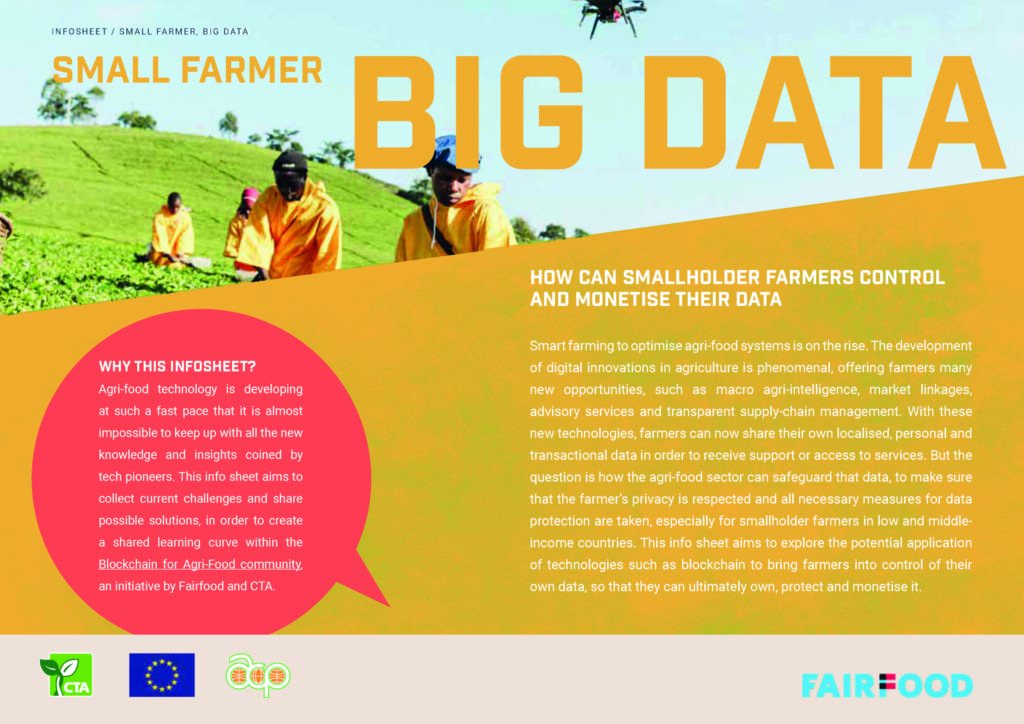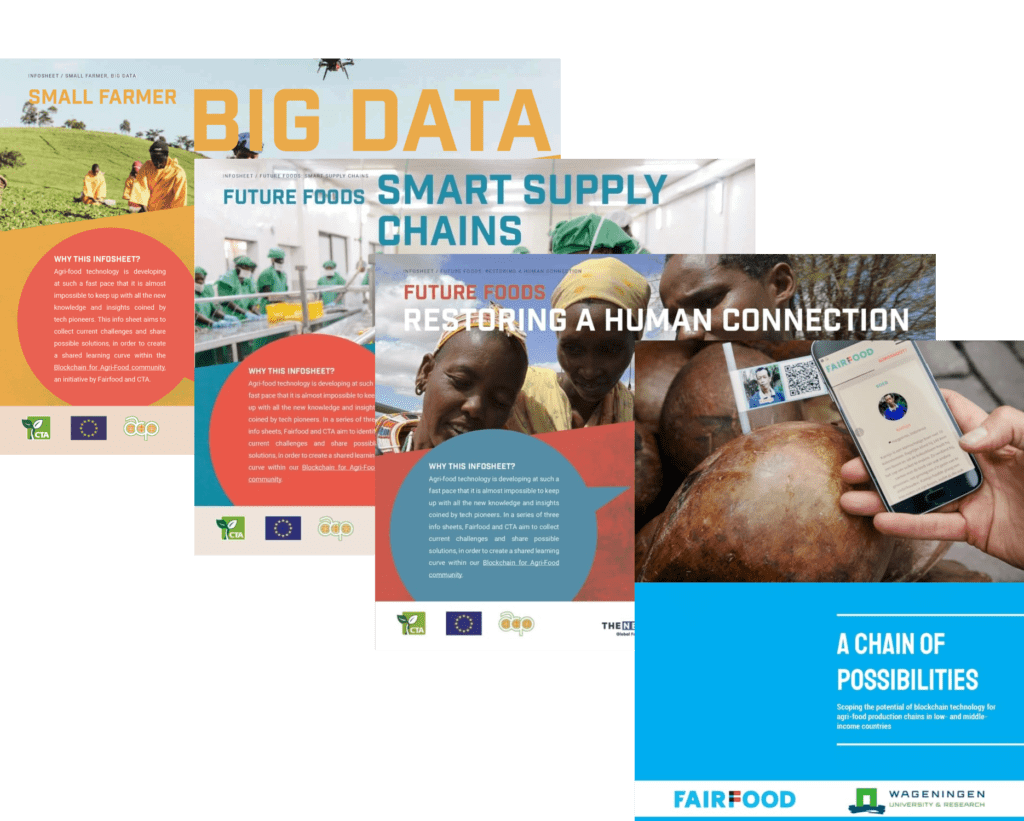How blockchain can help smallholder farmers: controle and monetise their data
At Fairfood, we identified nine ways in which blockchain technology can empower smallholder farmers. In a new blog series we will dive into these nine topics, looking at interesting use cases, reports and visionairs. In the second post, we explore how blockchain can help smallholder farmers control and monetise their data.
In today’s world, an increasingly large group of people has access to endless amounts of information, to countless products and to every service they can possibly dream of, from right under their thumb. We use online platforms for much of our communication, and sell and buy stuff, food and even our romantic getaways through smart online tools. While we are doing just that, sensors and smart devices are generating increasingly more data, which get processed in increasingly smarter ways to supply us with information to make better informed decisions.
A lot of the online services we use, claim to be for free. But, like we all know, nothing in this world is for free. Big tech firms simply found new ways to monetise their services by tapping into our two most valuable intangible assets: our attention and our data. By capitalising on our data and attention, they flipped the business model; instead of selling products and services to their users, the users have become the products. Products that are being sold across the world to the highest bidder.
If you are not paying for it, then you are the product
The importance of data ownership
Whether you are aware of it or not, when uploading pictures to Facebook, you give away complete ownership of those pictures to Facebook (you agreed to it!). When we store our data on Google Drive or Dropbox, we don’t officially give away the ownership of our data, but we do store the data on their servers which means they are in control. Depending on local privacy regulations, governments can request certain information and files in which case technology companies are forced to hand over the documents. On top of that, big tech firms are known for selling your data to the highest bidder.
If you saw The Great Hack (available on Netflix), you know that during the previous, 2016 US presidential elections, Cambridge Analytica, a company hired by Trump’s presidential campaigners, had 5.000 data points on every US citizen – 5.000 points that could be used and cross referenced in order to target the undecided voters, the people who were most easily to persuade. This group could be targeted online with exactly those arguments that would help persuade them, based on their historical online behaviour.
An article later published by The New York Times shows how online acquired data allows to pinpoint exact locations of 12 million smartphone users, including many visitors of the Pentagon and the White House. In the article it is explained how this data doesn’t originate from a telecom or giant tech company, nor from a governmental surveillance operation. The data originates form a location data company, one of dozens quietly collecting precise movements using software slipped onto our mobile phone apps – be it through your navigation app or the app you use to track your fitness.
It doesn’t take a lot of imagination to think of all the ways this data could be misused. The examples show how valuable data has become and why it is important that users of platforms stay in control of their data. Data shouldn’t be sold to third parties, unless the data subject is aware of this and explicitly gives consent. Consequently, there should be some form of reward for the data subject for handing over their data, think in the form of money or services.
In 2016, Cambridge analytica had 5000 data points on every US citizen
Data ownership for smallholder farmers
Why we at Fairfood are writing about this topic, you ask? Well, with the introduction of digitalisation in agri-food, farmers too are sharing their localised, personal and transaction data for the sake of receiving support or access to services. The development of digital innovations in agriculture is phenomenal. According to CTA’s Digitalisation of African Agriculture Report 2018-2019, at the moment over 13 percent of smallholder farmers in Sub-Saharan Africa is connected to smart agri-solutions. This number is only expected to increase as smartphone ownership in Sub-Saharan Africa is expected to grow from 25 percent to 50-80 percent by 2030.
Just like you, most smallholder farmers are not aware of the risk of data sharing and the implications it has for their privacy, making them an easy target for exploitation by big tech. One could argue that most smallholder farmers have other priorities than data ownership, which should be addressed first. This is true, however, if we are going to connect farmers to smart agri-systems, we should make sure these platforms are fair from the beginning, meaning the value of the data and attention generated by farmers on the platform stays in the hands of the farmer so they don’t get locked up into systems that don’t fully benefit them.
New encryption technologies like blockchain and decentralised file storage allow for increasingly better data ownership and monetisation. They allow users to make use of and interact with platforms without giving away their data, and even go as far as to let users put a price tag on their data and their attention when interacting with platforms.
One good example is the Indonesian data company HARA, which allows smallholder farmers to monetise their data by connecting data creators, data verifiers, data buyers and value adding services on a decentralised data exchange platform. HARA created a mobile app that assists smallholder farmers by offering advice in the most effective way to grow their crops. In the app, farmers can provide specific information about their farming practices including irrigation systems, pesticide and land use, and crop output. Third party data verifiers can confirm this data to ensure its value and integrity. The platform automatically rewards farmers and data verifiers for their work in cryptocurrencies, which they can exchange for cash at their local kiosk. According to CEO Regi Wagyu, HARA has already collected data from 27,000 rice and corn farmers in East Java. They plan to expand to the central and western part of the island.
Let’s stay sharp and critical from this early beginning and make sure new innovations are truly inclusive.
Want to learn more about how exactly blockchain can help farmers monetise their data? Download CTA and Fairfood’s info sheet:

Find out more
—
This article is made possible with the financial assistance of CTA (Technical Centre for Agricultural and Rural Co-operation). The views expressed above can in no way be taken to reflect the official opinion of CTA.


